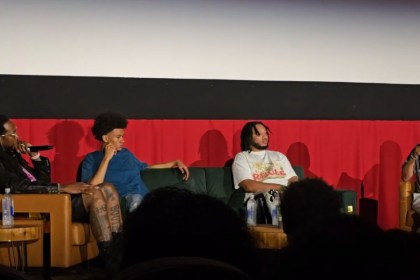The ’60s and ’70s can be described as a turbulent time in America. One incident that might have escaped your notice during the plethora of national news stories is being chronicled in Maia Wechsler’s, Melvin and Jean: An American Story, offered at the 20th annual Black Harvest Film Festival. So the story goes, in 1972, as an act of protest against the Vietnam War, Melvin and Jean McNair hijacked a plane from Detroit to Algeria to join the Black Panthers. Their dreams of a revolutionary utopia and freedom from racial oppression were soon dashed by the grim political and economic realities of their choices. This moving film reflects on the past and their ongoing struggle toward reparation and repatriation from their home in France, where they’ve lived as model citizens for 40 years. –tony binns
How did you learn of this particular moment in American history?
I met Melvin and Jean when I was student living in Paris in 1981. Melvin had recently gotten out of prison; Jean a couple of years before that. And I was with other American students who decided to organize a group of us to join French protests against certain aspects of American foreign policy at that time. We put fliers up around Paris to attract other expatriates living in Paris and this African American couple shows up. I didn’t know who they were; the other people I was working with didn’t know who they were. They sat quietly in a corner, didn’t say much and after the meeting they came up to me and it started like that. They were Melvin and Jean McNair and they didn’t immediately tell me their story, why they were living in Paris, but we became friends and little-by-little I got to know their story.
What was it about this project that resonated with you; what attract you to telling their story?
Well, I was a young child in the ’60s in Gary, Indiana, and my parents were very much involved in the local civil rights movement at the time. This was my environment. I understood, even as a young person what some of the broader issues were in the United States. I was a politically aware human being which led me to want to participate in, for example, the French demonstrations.
So, when I met Melvin and Jean their story really brought me right back to the United States; right back to what I understood about the struggles I had seen around me as a kid and what I knew continued to that day. Additionally, what struck me was they were living as free citizens, free members of a larger community in France, whereas if they stepped foot in the United States, they knew they would be arrested; they were fugitives from American justice. So immediately the question for me was: How is it that two people can be viewed from a diametrically opposed perspective in two Western nations, two “developed” nations.
Were you able to answer the question you set out to in the film?
Yes, to some degree. But, I think ultimately what I hope the film does is allow viewers to scratch beneath the surface of our assumptions about people, to humanize the characters and offer some context for their act.
Director Maia Wechsler will be present for audience discussion at both screenings. Screenings will be Tuesday, Aug 5 at 8:15 p.m. and Wed, Aug 6 at 6:15 p.m. at the Gene Siskel Film Center of the School of the Art Institute of Chicago, 164 N. State St.
The Black Harvest Film Festival runs Aug. 1-28, 2014. www.siskelfilmcenter.org/blackharvest_2014












